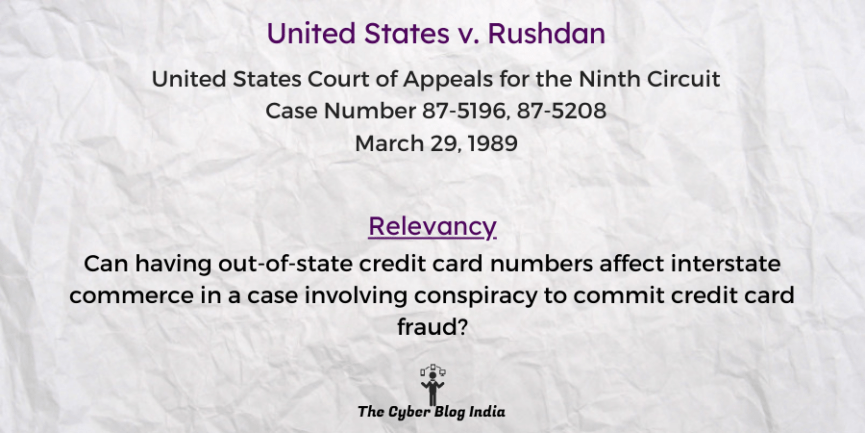United States v. Rushdan

United States v. Rushdan
870 F.2d 1609
In the United States Court of Appeals for the Ninth Circuit
Case Number 87-5196, 87-5208
Before Circuit Judge Schroeder, Circuit Judge Reinhardt, and Circuit Judge Leavy
Decided on March 29, 1989
Relevancy of the Case: Can having out-of-state credit card numbers affect interstate commerce in a case involving conspiracy to commit credit card fraud?
Statutes and Provisions Involved
- The Violent Crime Control and Law Enforcement Act, 18 U.S.C. § 1029
Relevant Facts of the Case
- The defendant and two individuals, Newton and Batie, met to discuss using and manufacturing counterfeit credit cards. Batie was then working at the First Interstate Bank of California.
- Batie obtained a list of credit card account numbers. The defendant then delivered two of these cards to a third party to obtain cash from them.
- However, surveillance agents caught the third party in possession of the counterfeit cards. The Secret Service later arrested the defendant and his co-worker during their meeting. When the agency searched the co-worker, it found 15 unauthorised credit card numbers from the existing accounts at the bank.
- The prosecution charged the defendant and his co-workers with conspiracy to commit credit card fraud. Further, the prosecution also charged the defendant with possessing unauthorised access devices.
- The trial court denied the motion without prejudice as to the conspiracy account. Still, it ruled on the motion as to the possession count.
- In the present case, the prosecution has appealed the grant of judgment of acquittal on the possession count. On the other hand, the defendant has appealed the denial of judgment of acquittal on the conspiracy count.
Prominent Argument by the Counsels
- The defendant’s counsel contended that the evidence was insufficient to show that the conspiracy affected interstate commerce. He did not purchase any goods with counterfeit bank cards and couldn’t use the credit cards in a manner affecting interstate commerce.
- The prosecution’s counsel argued that the district court erred in granting the defendant’s motion for judgment of acquittal on the possession count. The court relied on the fact that an undercover agent had supplied the defendant with numbers.
Opinion of the Bench
- A conviction for conspiracy to violate a law with an interstate commerce element does not require that the conspiracy actually affects interstate commerce.
- The legislative history shows that Congress intended a broad jurisdictional base for federal prosecution of counterfeit credit card crimes. The possession of out-of-state credit card accounts is an act clearly within the intended scope of federal jurisdiction.
Final Decision
- The court reversed the district court’s grant of judgment of acquittal for the possession count while affirming the denial of judgment of acquittal for the conspiracy count.
Srikari Ammanamanchi, an undergraduate student at the NALSAR University of Law, prepared this case summary during her internship with The Cyber Blog India in May/June 2022.
